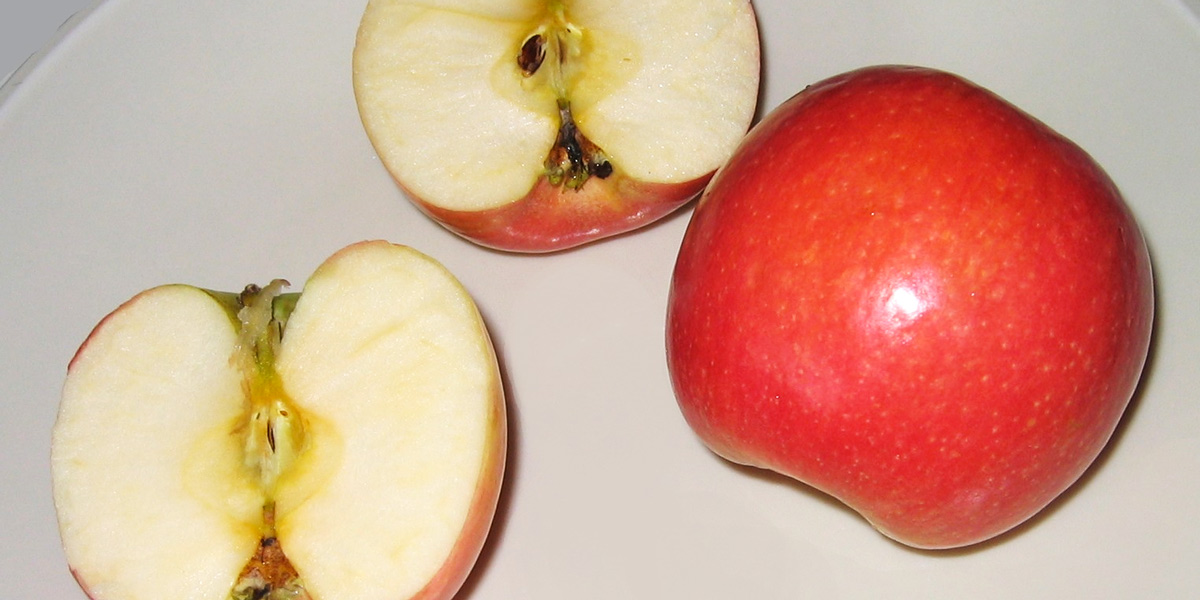
Todd Fryhover, president of the Washington Apple Commission, wonders why we need the GMO Arctic non-browning apple when there are already non-GMO apples on the market that naturally don’t brown
There are plenty of absurd claims about GMOs in the article below – e.g. that GMOs in the US are “thoroughly vetted” before commercialisation and that “plants have been genetically modified for a long time, and generally it’s used to make the food safer”.
But amid the nonsense are some gems.
For example, Todd Fryhover, president of the Washington Apple Commission, “does wonder why we need the Arctic apple when there are already apples on the market that naturally don’t brown”. “Cripps Pink doesn’t brown,” he said. “There’s a brand new apple that’s going to come available out of the state of Washington called Cosmic Crisp, it’s a non-browning apple.”
We have also found that non-GM non-browning potatoes are available in UK supermarkets, though they are not marketed as such. They just don’t go brown when cut.
Apparently Okanagan Specialty Fruits, developer of the GMO non-browning Arctic apple, didn’t want to comment on this story. That’s quite understandable.
—
The world’s first GMO apple will not turn brown, but is it safe?
BY RACHEL BELLE
KIRO Radio, Ron and Don Show Reporter, February 1, 2017
http://mynorthwest.com/530866/this-gmo-apple-will-not-turn-brown/
The world’s first GMO apple is hitting the U.S. market next month, but it’s not a Washington apple. The Arctic Apple is produced by Canada’s Okanagan Specialty Fruits and its fancy GMO magic trick is that it will not turn brown.
“Specifically what’s done with that apple is they’ve turned off that browning gene,” said Todd Fryhover, president of the Washington Apple Commission. “There’s nothing introduced into this particular apple to make it Frankenapple.”
With all the hype surrounding GMO’s (Genetically Modified Organism), I wondered if Fryhover was concerned about an apple being genetically engineered.
“The Washington apple industry is a strong supporter of science. Science is something we use every day, whether it’s pests or disease, it provides us with new crosses of varieties so we have better tastes and textures for consumers. So in that context, we’re not against GMO from the scientific standpoint. Where we do struggle with this GMO apple is more from a marketing standpoint. Consumers are not as educated as they could be on GMO products. A lot of times there is negative response to GMOs and maybe it’s warranted and maybe it isn’t. But certainly when you’re the conventional supplier of apples out of the state of Washington; we supply over two-thirds of all the apples in the United States and represent 90 percent of all the exports from the United States into international markets, having to defend our product, conventional, versus a GMO product, is going to be a major problem for us in the marketplace.”
The GMO apple
Both Fryhover and University of California, Davis plant sciences professor Kent Bradford say there is no evidence that GMOs are harmful to people.
“People generally don’t hear about the potential benefits,” says Bradford. “They do hear a lot about the potential negatives because there are certain groups that make it their business to promote those and exaggerate them. Since we have a very strict regulatory system, before you can actually commercialize something it has to go through government review. There are three agencies involved in that, the FDA, USDA, and EPA. So they’re very thoroughly vetted before they get out. Which is good for safety but it’s hard for having examples. If we had a lot of these examples of good, positive things that are happening with this technology, it would be hard to make the argument that they’re dangerous. In fact, it’s a very slow and expensive process. For example, this apple is perfectly innocuous. All it will do, probably, is make apples more attractive and maybe kids will eat more of them. It’s been a decade, I think, they’ve been working on getting that apple through the regulatory process to be able to actually sell it.”
Both say that plants have been genetically modified for a long time, and generally it’s used to make the food safer. Bradford gives examples of a couple of experiments gone wrong, where allergens were introduced, but those products never made it to the market.
Fryhover does wonder why we need the Arctic apple when there are already apples on the market that naturally don’t brown.
“Cripps Pink doesn’t brown,” he said. “There’s a brand new apple that’s going to come available out of the state of Washington called Cosmic Crisp, it’s a non-browning apple.”
Okanagan Specialty Fruits didn’t want to comment on this story. They plan to sell Arctic versions of Golden Delicious and Granny Smith apples, pre-sliced and packaged. They also plan to put snowflake symbols on the apple labels to distinguish them from non-modified fruits.